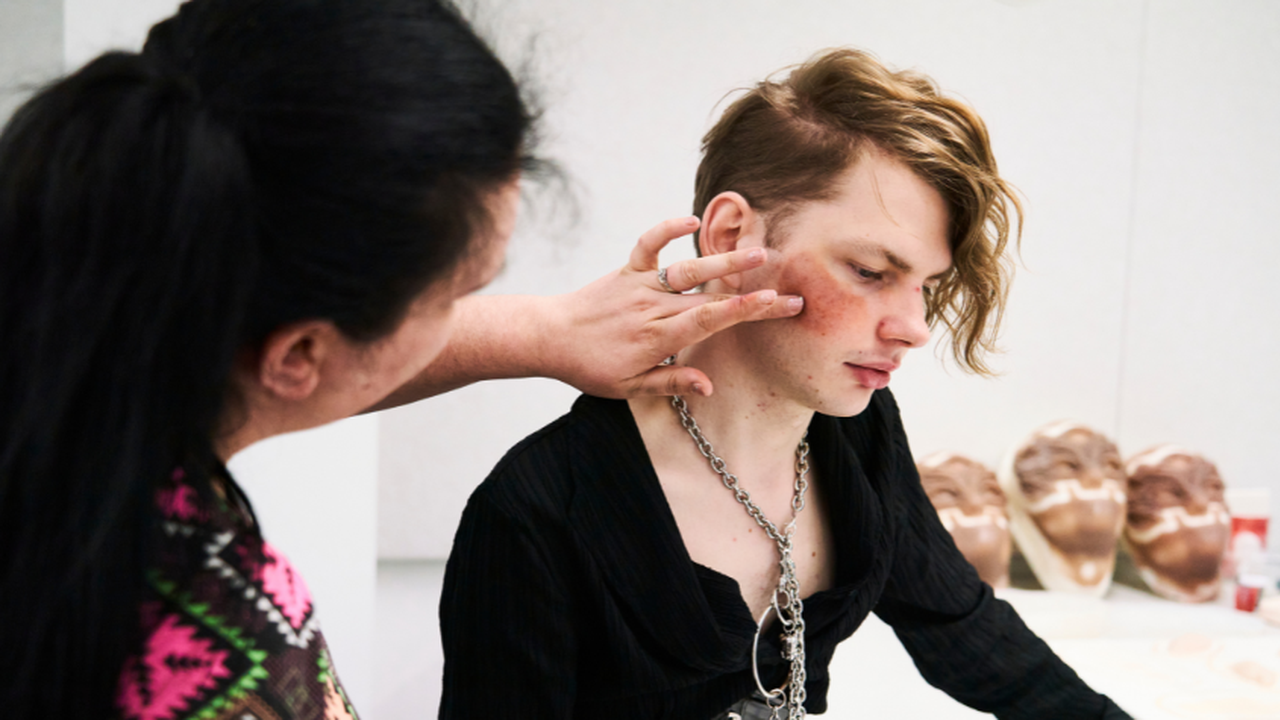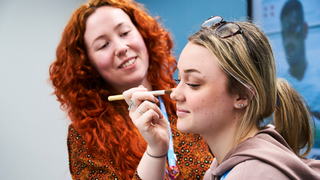Questions and Answers about Special Effects Make-Up Courses

If you're creative, curious, and love anything to do with movies, monsters, or transformations, special effects (SFX) makeup might be the direction you didn’t know you were looking for.
With an expected global market size of 5.6 billion by 2031, now is the perfect time to get your foot in the door of an exciting industry!
This guide answers the most common questions about SFX makeup courses, such as what they involve, how to get started and where they can take you. Whether you're leaving school, changing paths, or just exploring options, reading this might be the start of something big.
What is special effects makeup?
Special effects makeup is the art of creating illusions through makeup and prosthetics. Think zombie wounds, sci-fi creatures, or characters that age 50 years in one scene. It’s used in film, TV, theatre, live events, haunted houses, and even medical training simulations.
Unlike beauty makeup, which enhances someone’s natural features, SFX makeup transforms a person entirely. It could be as subtle as a black eye or as complex as a full alien headpiece. Artists work with materials like latex, silicone, gelatine, clay and paint to make it all believable!
If you’ve ever watched behind-the-scenes footage of a horror movie or a superhero film and thought “How do they do that?”, well…that's SFX makeup at work!
How to learn special effects makeup
You can start experimenting at home with basic kits or YouTube tutorials and that’s a great way to test the waters. But if you're serious about making this a career, enrolling on a special effects makeup course will give you a huge advantage.
A good course gives you access to professional tools and products, along with structured training from people who’ve worked in the industry. You’ll learn everything from the ground up, so you don’t need prior experience, all you need is passion and commitment.
Plus, learning in a studio environment gives you valuable feedback, deadlines to push you and a network of people on the same journey.
What does a special effects makeup course involve?
Most courses are hands-on and fast-paced. You’ll start with the basics, like how to create bruises, cuts, burns, and scars, and then move into more advanced work like:
- Sculpting characters in clay
- Moulding and casting prosthetics
- Applying silicone pieces to actors
- Creating creatures and fantasy looks
- Airbrushing and painting realistic skin tones
- Understanding hygiene, safety and on-set etiquette
Many courses also help you build a professional portfolio and teach you how to work on real sets, pitch yourself to clients, and find paid opportunities in the industry. Here at UCEN Manchester, we even offer placements or connections with production companies, giving you a foot in the door right away.
Learn more: Make-Up and SFX Courses: Postgraduate Stories
How to get into special effects makeup
What you need is creativity, a solid work ethic and the courage to try something different.
You can start by practicing at home and sharing your work on social media to build confidence and get your name out there. Attending workshops or short introductory courses can also give you a feel for the craft and help you decide if it’s something you want to pursue further.
Enrolling in a full-time or part-time SFX course is a great way to gain structured training and industry insight. You might also reach out to local productions for hands-on experience, even if it’s unpaid at first.
Finally, connecting with other artists can help you learn new techniques, stay inspired, and grow your network.
Is special effects makeup a good career?
the right kind of person…yes, it can be amazing!
SFX makeup isn’t your average job. It’s creative, unpredictable, and very hands-on. One day you might be making someone look dead for a crime show. The next, you’re transforming a man into a werewolf for a music video. If you're someone who gets bored easily, this career will keep you on your toes.
That said, it’s not always easy. Most work is freelance, so you'll need to hustle a bit to build clientele. But for people who want a career that’s fun, expressive, and different from the 9–5 grind, SFX makeup is a serious option.
How much do special effects makeup artists make?
Special effects makeup can be a good way to earn a living, especially if you enjoy hands-on creative work. In the UK, the average salary for a Makeup and SFX Artist is around £28,600 a year, with total pay (including things like bonuses or tips) reaching about £30,200.
That means most people in the field are earning somewhere around that amount, though some earn less when starting out and others earn more as they gain experience.
What skills do you need to be a good special effects makeup artist?
Although it might just sound like all you need is artistic skill, there are a few other key traits that help you thrive as a SFX make-up artist:
- Creative thinking: you're constantly solving visual problems
- Attention to detail: the best work looks completely real
- Patience: a single prosthetic can take hours
- Teamwork: you’ll be working with actors, directors, and crew
- Time management: you often work to tight shooting schedules 4
- Confidence: you need to trust your vision and your hands.
Do I need to be good at art to do special effects makeup?
Not really. You don’t need to be amazing at drawing or painting, especially when you start. What matters more is having a good eye, being willing to practice and enjoying the creative process.
Most courses teach you the skills you need from the beginning. You'll improve through repetition and guidance, not because you were born an artist.
How long does it take to become a special effects makeup artist?
That depends on the path you take. A short course might last 4-12 weeks and give you a basic intro. Full-time special effects make up artistry bachelors usually run for 12 months and many include job-ready portfolio development.
Becoming really good takes time. Even after training, you’ll continue learning on the job. Many successful artists spent their first couple of years assisting others, taking on small jobs and building experience.
What’s the difference between beauty makeup and SFX makeup?
Beauty makeup is about enhancing natural features - think weddings, glam looks, birthdays or fashion editorials.
SFX makeup is about transformation. That could mean creating a realistic injury, aging someone, turning an actor into a demon or building a full creature suit. Both require skill, but they use different products, techniques, and goals. SFX tends to be messier, more technical and more experimental.
Can I do both beauty and SFX makeup?
Absolutely! And being able to do both makes you more valuable. On many sets, productions look for artists who can do the full range, especially when the budget is tight. Some of the best makeup artists combine skills from both areas to create complete characters, from flawless foundation to a fantasy eye look.
Can I freelance as a special effects makeup artist?
Yes, and many do. Freelancing gives you the flexibility to work on different types of projects, including film, TV, music videos, commercials, theatre, or events.
You'll need to:
- Build a strong portfolio
- Promote yourself online and in person
- Stay organised with bookings and finances
- Be ready to adapt to different clients and teams
It can take time to build momentum, but once you’ve got a few jobs under your belt, word of mouth starts to spread.
How do I get experience after a course?
Getting your foot in the door takes a mix of initiative and persistence. Try:
- Volunteering on student or indie film sets
- Working backstage at theatre productions
- Assisting established SFX artists
- Entering makeup competitions or cosplay events
- Posting your work online to attract attention
- Contacting your previous placement
The more you put yourself out there, the more chances you’ll create.
Where is the best place to study SFX makeup?
At UCEN Manchester, our SFX makeup courses are built for people who want to turn creativity into a career. We offer a SFX Makeup BA hons (top up) and a SFX Makeup foundation degree.
“The tutors helped me whilst I was on this course because I felt like every inch of my creativity was valued. I genuinely felt supported throughout my time on the course.” - Rebecca Birch, SFX Makeup Artistry Graduate.
We focus on practical, hands-on training, including everything from prosthetics and casualty simulation to creature design and sculpting, taught by tutors with real industry experience.
What sets us apart is how closely we connect students to the working world. You’ll build a professional portfolio, work on live briefs and train in studios that reflect what you’ll find on actual sets. If you’re ready to get serious about special effects makeup, this is where your career can start. Enrol today to begin your journey to an exciting career!

